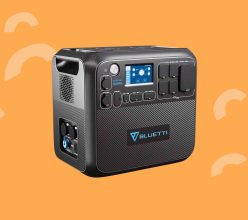
Do you want to have a great outdoor experience but not sure what the cost of tent camping in the US will be? On average, tent camping can range from as little as $10 per night to more than $50.
When it comes to camping, it’s not just about pitching a tent in the forest. It’s about the journey, the experience, the memories, and also the costs involved! From the camping gear you’ll need, to the campground fees, food, general supplies, and travel expenses, there’s a lot of things that can impact the overall cost of your camping trip.
Key Takeaways
- Camping gear such as backpacks with rain covers, tents and sleeping bags cost anywhere from $0 – $400.
- Average campgrounds cost per night range from $20 – $50 depending on season and location.
- Firewood usually costs $7 – 15 per bundle at most campgrounds or can be brought in from outside the park boundary to save money.
- Campground prices vary based on amenities offered, seasonality, size of accommodation and length of stay.
In this blog post, we’ll take an in-depth look at all aspects of budgeting for and planning your next wilderness adventure, including setup costs, variable expenses factors that affect prices. We’ll even share a few money-saving tips to help you save money whereever you can.
The Average Cost of Tent Camping in the US
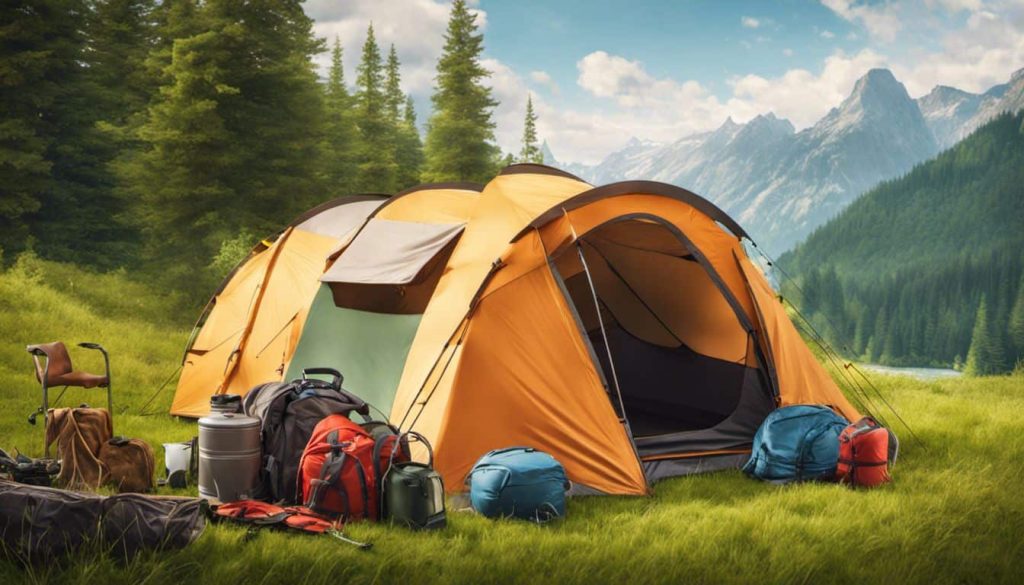
When it comes to camping, several factors can influence the overall cost. These factors include:
- Camping Gear: This includes the cost of your tent, sleeping bag, camping stove, pots and pans, and other necessities.
- Campground Fees: This is the cost per night to rent a campsite, which is where you’ll pitch your tent. Campsite costs can vary depending on the location, amenities, and time of year.
- Food and Supplies: This is self explanatory and covers the cost of drinks, meals, snacks, and firewood.
- Travel Expenses: This basically equates to the cost however you plan on getting to your destination, i.e. by plane, train, automobile or some combination of all three.
- Optional Extras: These costs are the cherry on top of your entire trip and include optional extras like guided tours, fishing licenses, or equipment rentals.
From buying camping gear such as sleeping and kitchen equipment to stocking up on other essential items, you need to consider the initial cost of setting up a tent camp.
The Setup Cost of Tent Camping
Camping gear for sleeping
Camping gear is a must-have if you plan on setting up camp in the wild. The setup cost of tent camping can range from $231 to $2,762 depending on what type and how much equipment you need for your camping adventure.
In order to keep yourself cozy, warm and – most importantly – dry at night, it’s important to invest in different types of camping gear for sleeping such as backpacks with rain covers, tents, and sleeping bags. Backpacks with rain covers are essential for keeping the contents inside dry while also transporting your supplies.
They can cost anywhere from $0 to $150 depending on size and quality. Basic tents will ranges from around $50 to up $400 when looking into higher quality models that offer more features like adequate storage space.
Camp kitchen equipment
As important as sleeping gear and tents, camp kitchen equipment is essential to having a successful camping trip. The right tools help you make the best meals and enjoy all of your outdoor adventures without issue.
From cookware like pots, pans, carving boards and plates to utensils such as knives, forks, spoons and can openers; there are many items that belong in every camper’s kitchen. Having these essentials will make meal preparation easier while also providing safety during campfire cooking.
Average Cost of Camping Gear
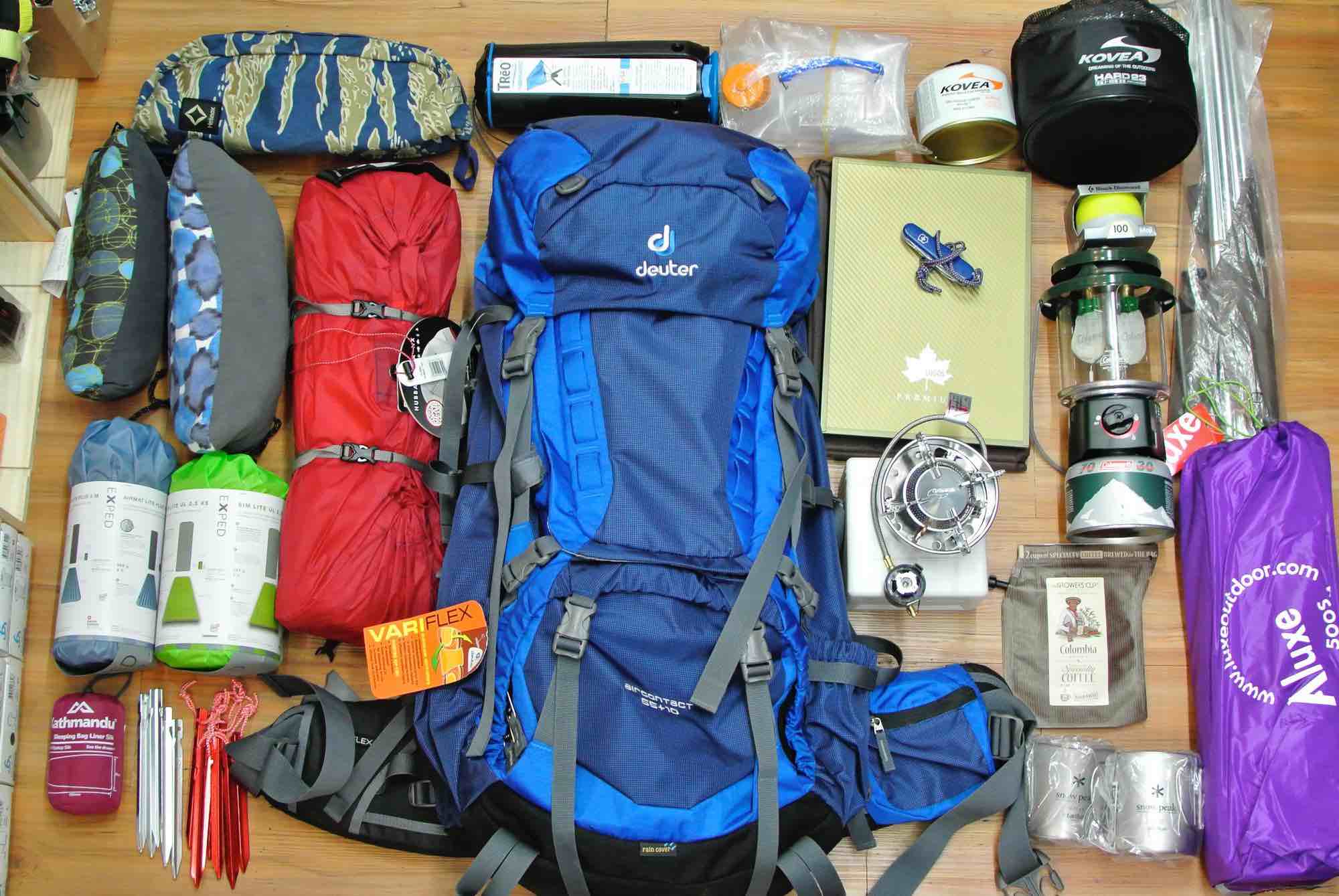
Investing in quality camping gear is essential for a comfortable and safe camping experience. Here’s a rough estimate of the costs:
- Tent: Depending on the size, quality and type of tent, your shelter can cost anywhere from $100 to $600. Remember, a good tent should be able withstand various weather conditions and durable enough to be used for many trips.
- Sleeping Bag: A decent sleeping bag that can keep you warm in different weather conditions can cost between $40 and $300. Sleeping bags designed for freezing temperatures tend to be more expensive.
- Sleeping Pad: A basic sleeping pad that provides some cushioning and insulation from the ground can cost between $50 and $100. However, more advanced sleeping pads with features like self-inflation or increased insulation can range from $50 to $200.
- Camping Stove: A reliable camping stove for cooking meals can range from $50 to $150, depending on the brand and features.
- Other Essentials: Other camping essentials like a lantern, camping chair, cooler, and cooking utensils can add another $50 to $100 to your camping budget.
Key Takeaway: Buying used gear or renting can significantly reduce these costs. Also, investing in quality gear can save you money in the long run as it tends to last longer.
In the next section, we’ll look at the average cost of campsite fees across the U.S.
When it comes to prices for this type of gear, they vary depending on the materials used such as stainless steel or aluminum. But typically even larger sets range from $50-$100 giving you enough pieces for up to four individuals.
Other camping gear expenses (flashlights, first aid kit, etc.)
Beyond the cost of a tent and other sleeping gear, campers should also consider their safety while they are camping. Flashlights, first-aid kits, waterproof storage containers, bear bags, and noise makers are all essential items for ensuring a successful trip in the outdoors.
For novice campers on a budget, basic supplies such as flashlights and first aid kids can be found at reasonable prices: many retail outlets that sell outdoor equipment will have these items starting from around $20 for LED flashlights or standard “survival” kits under $50.
However more experienced campers may instead choose to invest in better (and often more expensive) pieces of gear like rechargeable headlamps or comprehensive backcountry medical kit—gear which will help keep you comfortable and safe off-the-grid in much harsher environments than your average campsite.
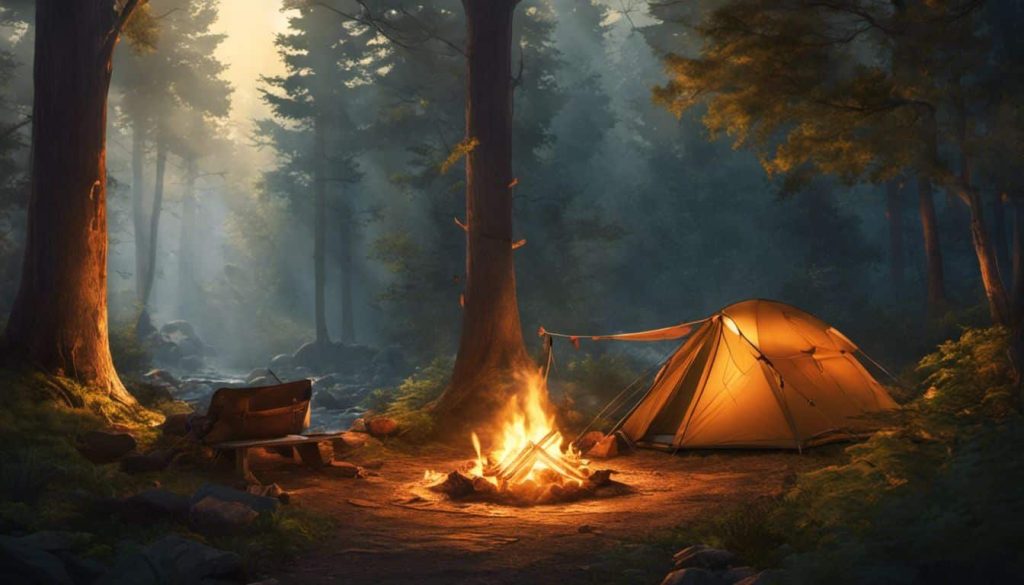
Variable Expenses in the Cost of Camping
Factor in the nightly cost of the campsite, firewood and any other recreational activities for your trip to calculate your total budget for camping.
Average campsite cost per night
For tent camping in the US, average campsite cost per night usually ranges from $20-$50. This amount can vary depending on season and location. National parks typically charge around $15-25 for a single night of camping.
Mid range RV campsites can cost an average of $30-$50 per night, while luxury RV resorts will often charge upwards of $60 to even more than $100+ for a stay with additional premium amenities.
In California, basic tent or RV sites at state parks and campgrounds have an average fee of around $20 -$50 per night. Additional fees may apply such as discounts or if bringing extra vehicles like cars, boats etc; length of stays could also affect price level too.
Cost of firewood
Firewood is one of the variable expenses to consider when budgeting for a camping trip. In general, campgrounds provide firewood for purchase or rent onsite, usually at an additional cost, ranging from $7 – $15 per bundle of wood.
Prices vary depending on factors such as type and amount of wood needed, amenities offered by the campground and geographic location. Visitors should always ask about prices before purchasing firewood so they don’t get overcharged.
Additionally, it’s important to note that some parks have specific regulations about buying or collecting firewood outside the park boundary due to concerns around non-native species introduction.
Spending on activities and entertainment
While tent camping can be a cheaper form of accommodation than many other lodging alternatives, it can still come at a cost. Activities and entertainment during the stay can really add up quickly so it must be taken into consideration when budgeting for the trip.
There are various activities and outdoor recreational options available to campers such as hiking trails, swimming holes, fishing spots, wildlife viewing, nature walks or photography sites; all of which usually require an admission fee or gear rental costs that should factored in while planning for your camping trip.
In addition to this, there might also be visitor fees or mandatory permits in some areas on top of any regular campsite charges incurred. Consider bringing along books from home or bringing a musical instrument to save money on fun activities while out enjoying the wilderness without breaking your budget!
Average Cost of Campsite Fees Across the U.S.
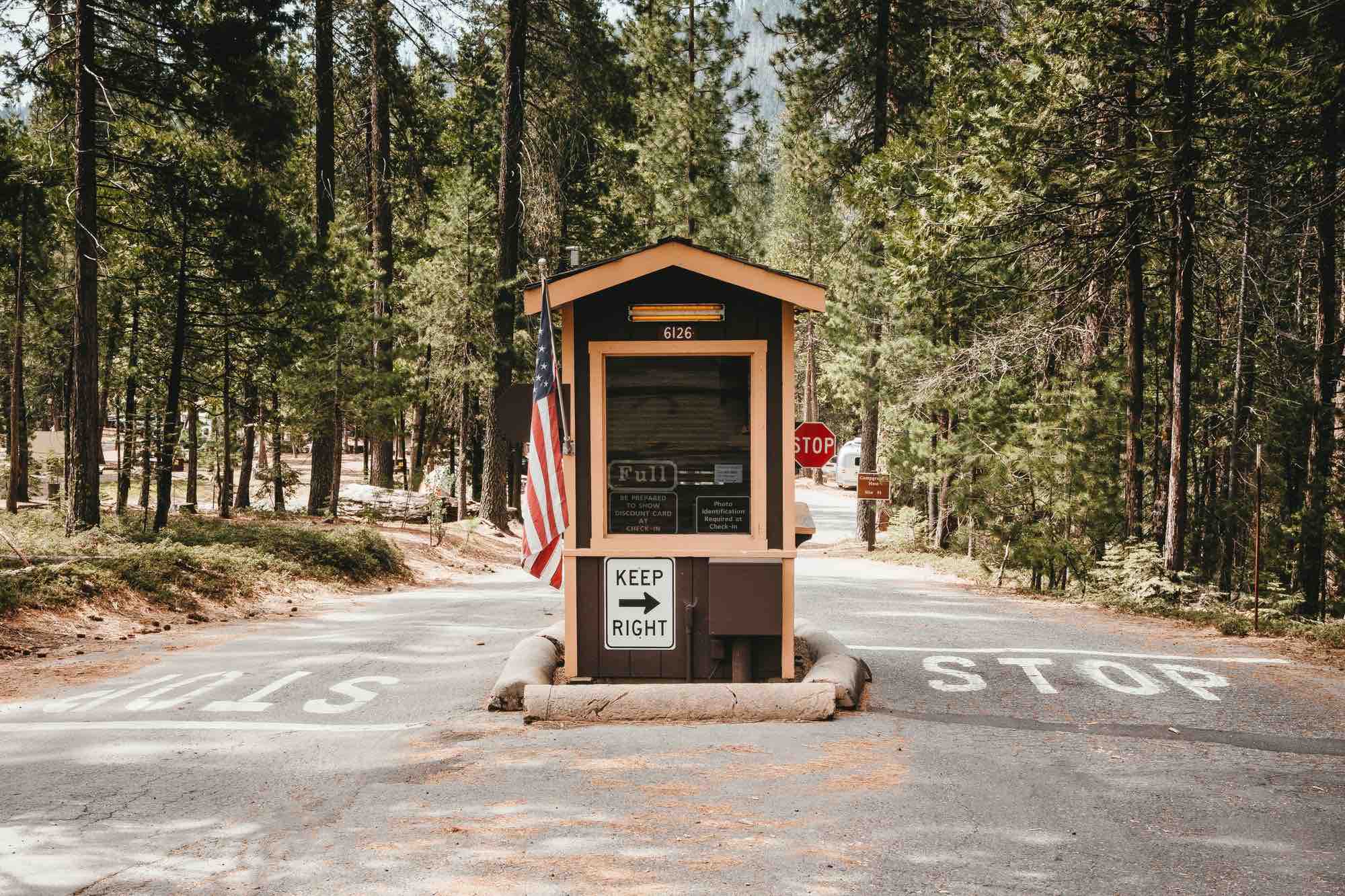
Campground costs can vary greatly depending on the location, amenities, and time of year. On average, you can expect to pay between $15 and $50 per night for a campsite in the United States.
Here’s a rough breakdown:
- Basic Campsites: These are typically the most affordable option, often costing between $15 and $30 per night. They usually include a spot for your tent, a fire ring, and access to a communal bathroom.
- Standard Campsites: These campsites often provide a few more amenities, such as electricity and water hookups, and usually cost between $25 and $40 per night.
- Premium Campsites: These are the most expensive option, often costing between $35 and $50 per night. They typically include all the amenities of a standard campsite, plus features like a larger site, rv sites with full hookups, more privacy, or a prime location.
Note that actual costs can vary depending on the specific campsite, time of year, and other factors.
Factors Affecting Campground Prices
Various factors such as the type of amenity, season, location and size affect a campground’s pricing, so learn more to make an informed decision about your camping experience.
Amenities offered
Campgrounds vary in the type and quality of amenities they provide. Basic facilities often include restrooms, water supply for drinking or washing, electrical connections (which can be used to power recreational vehicles), picnic spots, waste disposal sites, tent spots suitable for hammocking or pitching a tent with stakes and pegs, as well as group accommodations depending on the size of your party.
Amenities such as electricity can vastly increase comfort during a camping trip; however it also brings higher costs due to increased demand in campgrounds which offer them. State parks generally have designated campsites where you pay per head each night – these are often more expensive but come with amenities included such as electric hookups and potable water services at select sites.
Depending on whether you opt for primitive camping (no services) or choose amenities such as full hook-up sites (water/electricity) prices fluctuate accordingly throughout the industry trends based on availability not just location.
Time of year and seasons
Seasonal prices are a major factor when it comes to the cost of tent camping in the US. Peak season (spring and summer months) tend to have higher costs than during low season, which typically runs from fall through early spring.
For instance, at popular campgrounds in Jasper National Park, campsites can cost anywhere from around $40-$50 per night for two people during the low season whereas they may range up to $60-100 depending on facilities offered and size of your RV or tent during peak season.
Weather is another consideration as some destinations may still be experiencing cold weather even in the summer months and might not offer as many activities that one can do outdoors.
Location of the campground
The location of a campground plays a major role in determining its price. For example, premium locations like oceanside campgrounds are likely to charge more compared to other kinds of camping sites, as they offer excellent views and amenities such as beach access.
Furthermore, some state parks in Maine vary their fees according to residency; nonresidents pay higher camping costs than residents do. Campsites managed by the U.S. Forest Service (USFS) may cost differently from other campsites as well—it’s worth researching this when looking for your next spot to set up your tent or RV! Prices can also be affected by average monthly rates and discounts which might be available at certain times during the year – so do check availability against pricing before booking your trip away!
Size of your RV or tent
When planning a camping trip, the size of your RV or tent can have an impact on campground costs. Larger accommodations such as RVs and larger tents may require additional space and amenities which can result in higher fees.
Campsite prices are influenced by location, amenities offered, seasonality, and length of stay; however, the size of your RV or tent plays an important role as well. If you’re looking to save money on campsites but still need the extra space that comes with larger accommodation options like RVs, check for discounts that might be available during off-peak times or price matching policies from different campgrounds.
Additionally, some campgrounds may provide additional services specifically suited for large accomodations like hookups allowing electrical use so consider if any potential savings could be made this way as well when comparing different sites.
Length of stay
The length of stay at a campsite can have a significant impact on the overall price you pay for tent camping. In some cases, people may be required to stay a minimum of one night up to 14 days, depending on the type and location of the campground.
For example, Natchez Trace Parkway only allows stays up to 14 days combined throughout the year while New York State parks will vary from 1-3 nights as their minimum requirement. Generally speaking, staying longer usually comes with discounted prices or even free facilities compared to shorter stays.
Some private campgrounds also come with loyalty programs that reward guests for extended stays – an ideal option if you plan on returning often! Furthermore, extending your time by an extra day or two in any area is better value than changing sites after each night as it keeps your gear moving costs down while ensuring you get more out of each destination during your trip!
Discounts and fees
When it comes to tent camping, discounts and fees associated with campground prices can vary widely depending on a variety of factors. Amenities will often affect the price—the more luxuries accounts for more money – while state parks are often cheaper than private ones.
Prices may also differ based on location and how popular the area is, particularly at peak times like summer. Seasonal rates may offer some relief from sky-high costs too, such as reduced camp ground fees or free additional vehicle passes.
Further savings might be available thanks to discounted research or military rates that many campsites provide during slow seasons when there’s low demand. Campers should bear in mind however that additional taxes, reservation fees and services charges apply at certain sites so beware of hidden extra costs amidst all those tempting discounts!
Additional vehicles
Having extra vehicles on a campsite may incur additional charges. Campgrounds often impose a fee of $10 per vehicle, in addition to the price for the campsite itself. When renting an RV, there may be further fees associated with bringing multiple cars onto the space.
Some rentals charge flat fees per rental session – these could range from $20 to $90 depending on the company’s policies. Others may have hourly rates that increase for every vehicle used or brought onto the premises, which can add up quickly and should be considered when budgeting out camping trips.
Fees for extra cars vary based on campground type and location as well — national park campgrounds tend to have lower prices than private campgrounds or RV resorts. Be sure to read a campground’s rules carefully before booking your trip so you know exactly how many additional vehicles are allowed and what fees each will come with if any at all!
Number of people
The number of people camping has a large impact on the average cost of tent camping in the US. Campsite fees are typically charged per person, and generally decrease with larger groups.
Therefore, although splitting costs among several adults may not seem significant when planning your trip, it can add up to substantial savings for a family or group over multiple nights at campgrounds that charge by the head.
National park and state parks often provide discounts for those camping with large groups as well, though these vary by location and time of year. Additionally, sharing things like tents, firewood, stoves and other gear can help reduce both setup expenses and overall spending during larger outings.
Average Cost of Campsites in Different Types of Campgrounds
Knowing the rates of different types of camping sites can help you to find the most budget friendly option. Read more to learn about the cost range for each campground type in the US!
National park campgrounds
National park campgrounds provide a unique camping experience, allowing you to enjoy the wonders of nature while also being economical. These campgrounds are dotted across the country and provide a multitude of camping options. The table below gives a brief look at the average cost per night for camping at these campgrounds, along with the number of established campsites they offer.
Private campgrounds
Private campgrounds often come with a higher cost due to the amenities they offer. However, their rates can fluctuate based on factors such as location and demand.
| Factor | Explanation |
|---|---|
| Amenities | Private campgrounds typically offer more amenities than other camping options, including Wi-Fi, swimming pools, and recreational areas. These extras can drive up the cost of your stay. |
| Location | The location of the campground plays a big role in its cost. Campgrounds in popular tourist destinations or near major cities are likely to charge higher rates due to increased demand. |
| Demand | In peak travel seasons, demand for campsites grows. This can lead to higher prices, particularly in private campgrounds where availability may be limited. |
Keep in mind, private campgrounds also offer accommodations beyond traditional tent camping. This includes cabins and other lodging options, which can significantly increase the average cost compared to a simple tent site. But, with proper planning and budgeting, you can enjoy the benefits of a private campground without breaking the bank.
Tent camping prices
Tent camping is an affordable way to have a memorable outdoor adventure. The average cost of renting a campsite can range — from $20-50 per night, and they may offer electricity at an additional charge. National parks typically have lower rates than private campgrounds, with fees ranging between $15-25 for basic tent sites.
States like California tend to be a bit pricier with nightly rates between $20 and $50. Backcountry camping offers more remote locations and is usually the most affordable option with costs running around only $10 per night for tent sites; however, there could be extra parking or entrance fees associated in these areas.
RV resorts
RV resorts provide campers with luxury accommodations to make their camping experience even more comfortable. Not only do these resorts offer full hookups for those looking for a unique camping experience, they also have gravel roads and pads specially designed for RVs.
The amenities offered in an RV resort generally result in higher costs than public campgrounds; however, the specific cost varies depending on the peak or off-season rates of each particular RV resort. During low seasons – usually from fall through spring – campsite prices can range from $40-$50 per night, while during peak season rates usually go up to around $60-$100 per night.
Luxury RV resorts may charge up to $200 per night if they have amenities like swimming pools and spas. In addition, most sites come equipped with upgraded power systems like 50amp access that allow you to run multiple appliances at once without tripping a breaker or burning out wiring over long periods of use.
RV park costs
RV park costs can vary based on a variety of factors, such as amenities offered, the location of the campground and the size of your RV. Smaller parks might offer rates per night in range from $20-$40 for basic facilities, while more luxurious resorts tend to have higher fees ranging from $100-$200 or more each night. Mid-range RV camping typically lands between these two levels at around $30-$50 per night. The length of stay is also important when it comes to calculating cost; many parks offer monthly stays for under $500, making them much more budget friendly than frequent one-night stays. Discounts may apply depending on the time of year you visit and other special offers available through certain establishments. When looking into camping locations, always make sure to compare prices and read reviews thoroughly before booking your stay so that you find the perfect spot within your budget.
Comparison Table of Average Per Night Camping Cost in the US
| State | Average Per Night Camping Cost |
|---|---|
| Alabama | $25 |
| Alaska | $20 |
| Arizona | $16 |
| Arkansas | $25 |
| California | $35 |
| Colorado | $30 |
| Connecticut | $22 |
| Delaware | $50 |
| Florida | $25 |
| Georgia | $25 |
| Hawaii | $15 |
| Idaho | $20 |
| Illinois | $22 |
| Indiana | $26 |
| Iowa | $14 |
| Kansas | $18 |
| Kentucky | $17 |
| Louisiana | $20 |
| Maine | $23 |
| Maryland | $20 |
| Massachusetts | $22 |
| Michigan | $19 |
| Minnesota | $21 |
| Mississippi | $19 |
| Missouri | $20 |
| Montana | $20 |
| Nebraska | $22 |
| Nevada | $23 |
| New Hampshire | $27 |
| New Jersey | $23 |
| New Mexico | $12 |
| New York | $25 |
| North Carolina | $20 |
| North Dakota | $15 |
| Ohio | $23 |
| Oklahoma | $18 |
| Oregon | $20 |
| Pennsylvania | $25 |
| Rhode Island | $20 |
| South Carolina | $25 |
| South Dakota | $20 |
| Tennessee | $20 |
| Texas | $20 |
| Utah | $20 |
| Vermont | $23 |
| Virginia | $20 |
| Washington | $20 |
| West Virginia | $20 |
| Wisconsin | $25 |
| Wyoming | $20 |
Key Takeaway: National parks and state parks often offer affordable camping options. However, it’s important to book in advance, especially during peak camping season, as these sites can fill up quickly.
The Actual Cost of Tent Camping (with money-saving tips)
When it comes to planning your camping trip, the actual cost of your accommodation depends on a variety of factors, from the type of campground you’re staying at to the length of stay you book.
Cheapest camping level
Tent camping is one of the most affordable ways to vacation while also exploring the outdoors. For those looking for the most cost-effective option, a basic tentsite can be booked anywhere from $10 to $20 per night. Some primitive campsites are even free – however, these don’t provide any amenities like bathrooms. or drinking water.
Some campsites may have additional fees for electricity hookup but this will depend on where you book your site from; however, with some research you can find affordable options without added costs.
Moderate camping level
For campers who are looking for a more luxe experience than basic camping, yet still want to stay on the affordable end of the spectrum, moderate camping offers just that. Moderate camping provides more amenities and other added features without drastically increasing your budget.
The average cost per night for sites at a moderate level range from $20-50 (sometimes more if there is electricity). Campground prices can also differ depending on location; for example National park campgrounds can cost anywhere from $25 to $80, depending on the state, while RV resorts may run higher with nightly rates ranging close to $50 or more.
Luxury camping level
For those looking for a high-end camping experience, there are plenty of luxurious options available. Luxury camping accommodations come in formal or informal arrangements and various levels of cost, such as Airstreams and tents, with upscale furnishings, private bathrooms and kitchenettes.
These tent sites usually include many features to make the stay more comfortable than traditional camping like premium sleeping gear, top-of-the-line cookware and access to nearby recreational activities.
However, luxury campsites can cost almost $900 per night depending on the amenities being offered. Prices may also vary based on the location of the campground, size/type of RV or tent used for accommodation as well as discounts or additional fees applied; so it’s important to do your research before selecting an expensive option you might enjoy.
Tips to Make Your Camping Trip Cheaper
- Look for discounted camping gear either online or from resale shops. You may be able to find gently used items like tents, sleeping bags and footwear at the fraction of retail price.
- Consider camping in national parks rather than private campgrounds, as these are typically cheaper alternatives.
- Buy food in bulk beforehand, such as buying canned foods that do not require refrigeration. Also consider utilizing reusable containers to reduce waste and save money on packaging costs.
- Research campsite options ahead of time to compare prices and determine which one is most affordable according to your budget needs.
- Keep an eye out for special discounts or specials offered by campgrounds, hotels or restaurants when you plan your route ahead of time – some offer lower rates if you book multiple nights at once.
- Use discount codes when signing up for online services related to camping, such as airfare searches or membership programs with hotel chains .
- Consider investing in a multiuse outdoor item instead of purchasing limited use single items – this can help reduce cost significantly over time (e.g., hammocks).
Helpful Camping Resources
- Campendium: This website provides campground reviews and photos from campers, for campers. It’s a great resource for finding the best places to camp, including free camping sites.
- Reserve America: This is a comprehensive resource for reserving campgrounds in the United States. It includes information on federal, state, and private campgrounds.
- National Park Service: The official website for the U.S. National Park Service. It provides information on camping in national parks, including costs and reservation details.
- Recreation.gov: This is a one-stop resource for making reservations on federal lands, including national parks and forests.
- KOA (Kampgrounds of America): KOA offers a wide variety of campgrounds across the U.S. with different amenities and services.
- Hipcamp: This website is like Airbnb for camping. It allows you to book unique camping experiences on ranches, farms, vineyards, and public parks across the U.S.
- The Dyrt: A comprehensive resource with reviews, photos, and details for more than 44,000 campgrounds and RV parks in the U.S.
- AllStays: This site provides information on a variety of lodging options, including campgrounds, RV parks, truck stops, rest areas, and more.
Conclusion
Camping in the US can be a frugal and enjoyable way to vacation. If budget is important, understanding the average cost of tent camping throughout different regions in the US before planning is key.
Making sure that you have adequate gear and that you research campgrounds for discounts or promotions may also help keep costs down. Regardless of budget, with proper planning a camping trip can be an excellent way to enjoy nature and spend quality time with family or friends.




